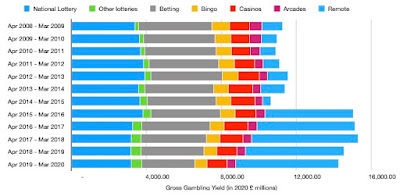It seems that the removal of sponsorship would not unduly harm Premier League clubs, but it would very probably have a serious effect on smaller clubs; some of those in the EFL might go out of business without this sponsorship if they cannot find alternatives. This would be highly regrettable, especially given the close link between some of these clubs and their local communities. The financial situation of some of them is currently particularly fragile because of the impact of the coronavirus pandemic on sport.
We therefore think they should be given time, perhaps three years, to adapt to the new situation. They would not be allowed in that time to enter into new sponsorship contracts with gambling companies, but any existing contracts could continue until they terminate, and clubs would have time to seek alternative sources of sponsorship.
The committee did not cite a single piece of evidence to justify a ban on gambling sponsorship. They just decided that there was too much of it.
It is generally assumed that the increase in advertising is one of the causes, perhaps the main cause, of gambling-related harms. There is certainly a correlation, but we have received no evidence nor been pointed to any research which proves that there is any causal link between gambling advertising and problem gambling. On the contrary, Mr Parker [CEO of the Advertising standards Authority] said: “The indicators do not accord with the view that the undoubted increase in gambling advertising and in accessibility to gambling services, through smartphones, is driving a significant increase in problem gambling.
Mr Parker added: “I worry about this, because it seems common-sensical that, if there is a big increase in the volume of advertising, all other things being equal, it ought to lead to an increase in problems. The data is not showing that ...” This concerns us too. Plainly the companies would not spend increasingly large sums on advertising if they did not believe that this would increase either the overall amount gambled, or the amount gambled with their company, or both, and it does indeed seem counter-intuitive that this should not also result in an increase in gambling-related harms.
'Flawed' EFL gambling evidence should be ignored - MP"Flawed" evidence submitted to the government's gambling review by the English Football League should be ignored, according to an MP who chairs a parliamentary group for gambling reform... Labour MP and chair of the All Party Group for Gambling Related Harm Carolyn Harris said gambling minister Chris Philp should "choose to ignore" the research in the gambling review, for which a white paper is due to be published within weeks.
The EFL, which is sponsored by Sky Bet and whose clubs receive £40m a year from gambling companies, commissioned research, seen by the BBC, which said there was "no evidence" that sponsorship influences participation in betting.
It also said that gambling participation in sport "had remained flat at about 9% of the population between 2010 and 2018" and over the same period "the rate of problem gambling in sports had halved from 6% to 3%".
Vita's critique, which was commissioned by campaign group Clean Up Gambling, said the research was "faulty" based on using two different types of survey to assess gambling participation and problem gambling rates.
One of those surveys, conducted by the NHS and which runs from 2012 to 2018, cautioned against combining its results from a previous version of the survey because different methods were used to collect data.
The EFL's research also said there was "no evidence that sponsorship of clubs or leagues by betting operators influences participation in betting, or being a Skybet customer".
But the influence to gamble or not was based only on fans whose team had a gambling sponsor on their shirts and whether their team played in the Sky Bet-sponsored EFL, disregarding any other sponsorship or advertising in football as a whole.
It also concluded that "not being a fan of football decreases the probability of being a bettor, and of being a Skybet customer".
Harris told The Sports Desk podcast: "A decent thing would be to withdraw [the EFL] evidence, but they're not going to do that. So you need to take it with a massive pinch of salt which I suspect [the government] do.
"[The minister] can ignore it, he can choose to ignore it or discard it. And I would like to think that he would, but we know he's overwhelmed with evidence at the moment. I don't think the gambling minister is entirely hoodwinked. I think he sees a lot of the content for his white paper as being flawed."




No comments:
Post a Comment